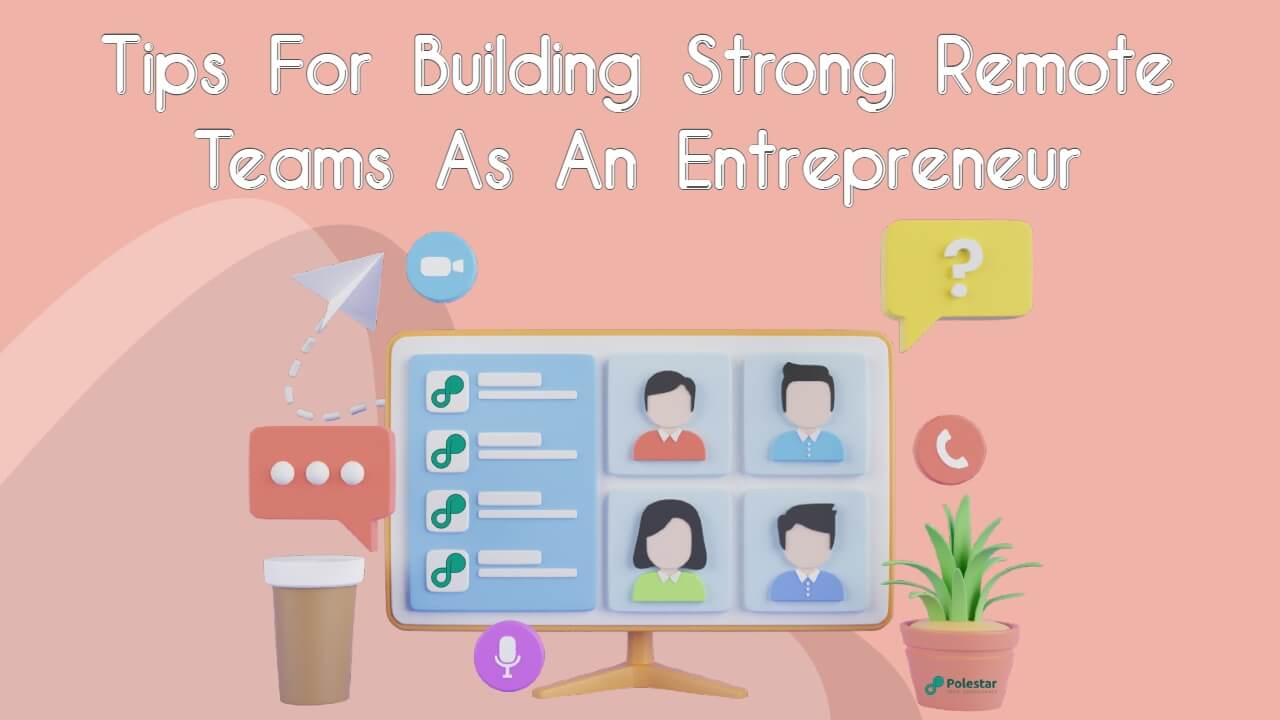04 May

If you are a budding entrepreneur, you’ll probably have much more on your plate than you can handle. But building and managing a remote team is a next-level challenge, right? Imagine working with people who aren’t in the office when you are at the startup stage. That sounds overwhelming, right?
But remote work is a reality that business owners need to accept and co-exist with. Did you know that a whopping 89% of companies already have a remote work policy in place? Organizations that provide the option to work from home are more likely to attract and retain employees. Another good reason to embrace the model is that it can save tons of money for your startup.
So how do you ace the remote work game for your new business? Let’s share some proven success secrets that every entrepreneur should know.
Common Challenges In Building A Strong Remote Team
Before learning the top tips to build a successful and efficient remote team, you must understand the challenges that your remote team will face.
- Lack of communication: It can be difficult to communicate effectively when team members are working in different time zones, have different communication preferences, or have limited access to communication tools. Additionally, nonverbal cues and body language can be lost in virtual communication, which can lead to misunderstandings, poor productivity, and missed deadlines.
- Collaboration: In a remote team setting, collaboration can be challenging when your employees are not physically together. Teams may struggle to work together on projects, share information, or brainstorm ideas. This can lead to a lack of cohesion and a sense of isolation among team members.
- Technology: Teams need reliable technology and infrastructure to work effectively remotely. Technical issues such as slow internet connection, outdated software, or incompatible devices can lead to delays and frustration. It can further make it difficult to access the necessary resources as and when needed.
- Cultural differences: When working with remote teams across different cultures, language barriers and different work styles can present challenges. So, you must be aware of these differences and work to create a collaborative culture that values diversity and inclusion.
Best Practices To Build A Strong Remote Team
In order to overcome all the challenges discussed above, you must follow the tips given below.
Master the art of communication
When you’re working with your remote team, communication is vital. Unlike a traditional office setup where you can pop over to an employee’s desk for a quick chat or have a face-to-face conversation, remote teams require a different approach. But with effective communication strategies, you can stay connected with your startup team and foster a sense of unity even when working from different locations.
It means leveraging digital tools, such as chat apps, video conferencing, and management software, to stay in touch. It’s also important to improve your writing skills. When you can’t meet in person, clear written communication becomes even more crucial.
Make sure your emails, instant messages, and other written communications are concise, professional, and easy to understand. This will help you avoid misunderstandings and keep everyone on the same page. The key is to find the right combination of digital tools and communication strategies that work best for your team’s unique needs.
Invest in the best technology
Let’s accept it - you cannot run a business remotely without tech investment. However, as a startup entrepreneur, you may not have enough funds to invest in expensive tech tools and resources. Therefore, it’s crucial to be selective and invest in must-haves instead of nice-to-haves.
In fact, understanding the concepts of Remote Assistance Vs Remote Desktop also enables you to choose wisely. Remote Assistance is a tool that allows you to provide remote support to your team members, while Remote Desktop enables you to remotely access your computer from another device. Investing in remote access software can provide you with the flexibility to manage your team’s work and ensure they easily access the required files.
Additionally, you can start with a few tools like cloud-based project management tools and communication and collaboration tools to streamline your operations and add more down the line as your startup grows. It will help you save time and money.
Prioritize productivity
Productivity might seem like the most daunting barrier when running a remote startup. You may even feel tempted to micromanage your employees and spy on them to ensure they only work during office hours.
But you’ve got to have the right mindset, boss! Prioritize productivity in terms of timely completion of tasks because it matters more than clocking hours. It shows that you trust your team, which motivates them to give their best.
One way to prioritize productivity is by setting clear goals and deadlines. Make sure your team knows what is expected of them and when their tasks need to be completed. Encourage open communication so your team can ask for help or provide updates on their progress.
Also, encourage your team to set up a workspace that is free from distractions and conducive to work. You can go a step ahead by celebrating your team’s achievement and offering bonuses or incentives for exceptional performance.
Ensure a good work-life balance
As a remote entrepreneur, you may struggle to draw a line between your personal and professional life. It’s easy to fall into the trap of working longer hours or checking emails well into the night. However, pushing yourself and your team too hard can lead to burnout and decreased productivity.
Instead, ensure an optimal work-life balance for yourself and everyone else on board. It sets up your team for long-term success and happiness.
For this purpose, you must set clear boundaries. Establishing a schedule and sticking to it can help prevent work from seeping into personal time. Encourage your team to take breaks and step away from work when they need to. This can result in a more loyal and motivated team who appreciates the trust you’ve placed in them.
Cultivate a winning mindset
Mindset matters a lot when it comes to remote work success. Entrepreneurs are in a good place in this context because they are inherently passionate and focused. However, building and managing a remote team requires a different approach and mindset. To cultivate a winning mindset, you must focus on key factors.
Firstly, embrace flexibility. One of the benefits of remote work is the flexibility it offers. As a leader, you should be open to different working styles and schedules. Give your team the autonomy to work in a way that suits them best while ensuring that deadlines are met, and work is completed to a high standard.
In addition to this, foster a culture of trust. Trust is the foundation of any successful team and is even more important in a remote setting. Make sure your team knows that you trust them to do their jobs and that they can trust you to provide support when needed.
Not to mention, remote work is still a relatively new concept, and there’s always room for improvement. Encourage your team to experiment, innovation and learn from their mistakes, and provide them with opportunities to develop new skills and knowledge. With the right mindset, you can build a strong and successful remote team to take your business to the next level.
Provide ongoing support and development
While remote work can provide flexibility and freedom, it can also lead to feelings of isolation or disconnection from the team. To combat this, it’s important to establish regular check-ins and feedback sessions with your team. Encourage open and honest communication and provide opportunities for your team to share their thoughts and ideas.
However, it’s not enough to just check in with your team and expect them to thrive. As an entrepreneur, it’s your responsibility to provide ongoing support and development to your remote team. This means offering training and development opportunities so the team can grow and improve their skills. This can be done through online courses, mentorship programs, or skill-building workshops.
By providing ongoing support and development, you can help your team members feel appreciated and valued. This will boost their sense of responsibility towards the company and increase their motivation to perform at their best. Moreover, it will boost employee morale and efficiency, helping you to achieve business goals. Ultimately, investing in your team’s growth and development is a win-win situation. Not only will it benefit your team members, but it will also benefit your business.
To Sum It All Up
Remote work success is not rocket science for entrepreneurs, provided they take the right approach from the outset. From utilizing digital tools to foster effective communication to implementing clear processes for delegation and decision-making, there are many ways entrepreneurs can build strong remote teams. It’s also essential to prioritize team building and create opportunities for team members to connect and get to know each other on a personal level, even if it’s just through virtual events.
With the right mindset and approach, entrepreneurs can embrace the opportunities that remote work presents and create an agile, dynamic team that can adapt to changing circumstances and thrive in a competitive market. So, what are you waiting for? Implement the strategies discussed right away!
.png)














Jay Pala